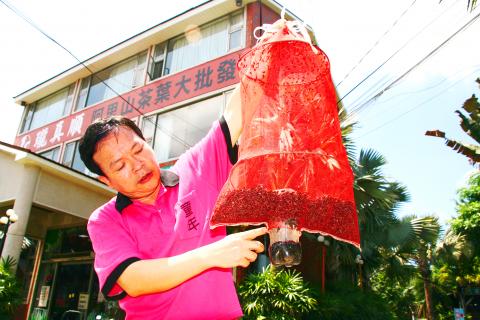The arrival of summer brings record high temperatures and all those annoying flies flying around everywhere. Customers at the Tung-Nien Holiday Resort in Chiayi County keep complaining about the huge amount of flies. Su Ying-chia, an employee at the resort, spent only a little more than NT$10 to design a flytrap that has managed to catch thousands of flies in a mere week’s time, so that now customers and people living in the neighborhood no longer have to tolerate all those bothersome flies.
Chen Ming-shun, the person in charge at the Tung-Nien Holiday Resort, said that as soon as summer arrives, flies scurry around all over the place, and are very difficult to catch. Even though a net surrounds the barbecue equipment, it is still hard to keep away all the flies, and customers often complain. If they used insecticides, it would pollute the environment and be poisonous to humans, so initially they did not know how to solve the issue.
In order to reduce the number of flies, Su spent a long time observing the insect’s behavior, and eventually discovered that whenever they got into small enclosed spaces, they would only fly upwards, sideways, and forwards, but never tried to get out from the bottom. Thus, Su came up with his simple flytrap design.

Photo: Lin Yi-chang, Taipei Times
照片:自由時報記者林宜樟
The flytrap is made from a net and an empty plastic bottle. First the bottle is cut in half, then a few holes are cut out near the bottom, and a raw fishtail is placed at the bottom. A metallic wire props up the net from inside, and the plastic bottle is fixed tightly to the bottom of the net using rubber bands or metallic wire after a hole is made in the net. The apparatus is then hung outdoors near an area where flies are found coming in and out.
Chen said the flies rush into the flytrap as soon as they smell the raw fish. Once they enter the trap, they can only fly around inside the net and eventually die after growing exhausted. An entire bag is usually filled up within just one or two days. With nets placed in several different spots, it is shocking to think that around a dozen bags of flies are thrown out within just a few days, weighing in at around 6kg, roughly estimated to be around 10,000 flies.
Chen said his invention is cheap, does not pollute the environment, and is easy to use. He has already made around a dozen for people in neighboring communities.
(LIBERTY TIMES, TRANSLATED BY TAIJING WU)
入夏後,氣溫屢創新高,惱人的蒼蠅四處飛,嘉義縣童年度假村因大量蒼蠅讓遊客抱怨連連。員工蘇盈嘉設計成本僅新台幣十多元的捕蠅器,短短一星期就抓了上萬隻蒼蠅,讓遊客及附近居民終於不必再忍受煩人的蒼蠅!
童年度假村負責人陳明順說,每年到了夏季,蒼蠅四處亂竄又難抓,度假村的烤肉設施,雖然架設紗網卻難以防範,遊客經常抱怨。但若噴灑殺蟲劑恐將造成污染,對人體也是有毒的,不知如何解決。
員工蘇盈嘉為減少蒼蠅,長期觀察蒼蠅的習性,發現蒼蠅若鑽到較小的密閉空間時,只會往上方、往旁與往前飛,不會從下方鑽出,因此構思設計簡易的捕蠅器。
簡易捕蠅器用紗網加上空寶特瓶做成,先將寶特瓶剪成一半,靠近底部附近剪出幾個小洞,底部則放入生魚尾巴。接著在紗網中用鐵絲撐開,下方剪開洞後將寶特瓶放入,用橡皮筋或鐵絲拴緊,最後這裝置懸掛在蒼蠅出沒的屋外附近。
陳明順說,蒼蠅聞到生魚味道不斷衝進捕蠅器,繞進去後,只能在網中飛舞,疲憊死亡後落在袋中,才放一、兩天就滿滿一袋,三、四個放置點,沒幾天共倒了十幾袋,秤重約有六公斤,粗估捕獲上萬隻蒼蠅,相當嚇人。
陳明順說,由於捕蠅器成本低又沒有污染,非常好用,他已製作十多個供附近社區民眾使用。
(自由時報記者林宜樟)

US President Donald Trump has renewed his ambition to take control of Greenland for national security reasons and questioned whether Denmark has any legal right to the Arctic island. The debate has revived scrutiny of how Greenland became part of Denmark, its current self-rule and path to independence, and Washington’s military footprint. HOW DID DENMARK GET GREENLAND? Greenland was inhabited by Inuit peoples from Asia and North America intermittently from around 2,500 BC. Around 985 AD, Vikings led by Erik the Red settled in southern Greenland, farming and building churches. Around the same time, ancestors of today’s Inuit arrived, living as hunters

A: Bloomberg just released its annual travel guide, titled “25 Best Places to Travel in 2026.” What were the best Asian destinations? B: There were actually six Asian hotspots: Taiwan’s Taipei, Malaysia’s Penang, Kazakhstan’s Almaty, Indonesia’s Rote Island, India’s Tiger Reserves, and Oman. A: With its mix of traditional food and modern cuisine, Taipei has become a rising food capital in Asia. B: As Bloomberg reported, “Taiwan is a place that bubbles up in culinary conversation because of its famed beverage, bubble tea, and its early adoption of modern night markets.” A: And Din Tai Fung has now

Owls have long fascinated people with their distinctive appearance and mysterious habits. These nocturnal birds possess large, round eyes and a flat facial disc. Their feathers come in shades of brown, gray, or white, helping them blend easily into the darkness. The most remarkable trait of owls is that they can turn their heads without damaging blood vessels. Contrary to popular belief, they can only rotate their heads up to 270 degrees, not 360 degrees. Owls have 14 cervical vertebrae, which is twice as many as humans. This special physical structure compensates for their inability to move their eyes within their

AI-generated summaries are shaking up the media world. Tools like Google’s AI Overviews now provide users with direct answers above the search results, resulting in fewer people clicking on news links. For publishers who rely on that traffic to generate advertising revenue, this shift is hitting hard. The fallout is measurable. Many sites have seen a sharp drop in traffic since AI summary features rolled out. An analysis revealed that a news outlet that had once ranked first on Google lost up to 79% of its traffic when its link appeared beneath an AI-generated summary. Statistics also show that